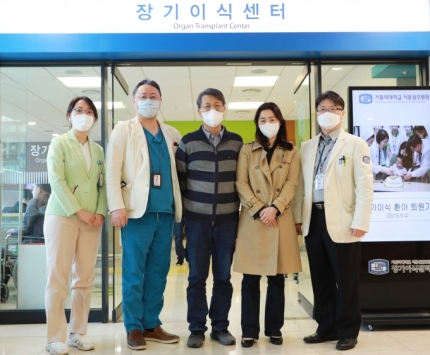RELATED Live.
- About us
- KIMA Members
-
KIMA Doctors
- All
- Anesthesiology
- artificial joint center
- Breast and Endocrine Surgery
- Breast cancer and thyroid cancer center
- Breast Surgery
- Cardiology
- Cardiothoracic Surgery
- Cerebrovascular Center
- Colorectal Surgery
- dental and maxillofacial surgery
- Dermatology
- Endocrinology
- Gastroenterology
- General Surgery
- Genito-Urology
- Hematology
- Hemato-oncology
- Infection Center
- Internal Medicine
- International Healthcare Center
- Korean Medicine
- liver center/Pancreas and billiary tract center
- Liver Transplantation
- Neurology
- Neurosurgery
- Obstetrics & Gynecology
- Ophthalmology
- Orthopedic
- Otorhinolaryngology
- Pediatric & Juvenile
- Pediatric Allergy and Respiratory Diseases
- Pediatric Gastroenterology
- Pediatric Neurology
- Pediatrics
- Physical Medicine & Rehabilitation
- Plastic & Reconstructive Surgery
- plastic surgery
- Pulmonology
- Radiation oncology
- Rheumatology
- Thyroid & Endocrine Surgery
- Urology
- Vascular Surgery
- KIMA News
- KIMA Live
- Community
KIMA NEWS
-The patient got COVID-19 positive just before kidney transplant operation → recovered → transplant operation performed → under recovery
Mr. Hyun (male, 46) with end-stage renal disease got COVID-19 positive while awaiting a kidney transplant. His wife and he were not discouraged. He started to take treatment for COVID-19.
Three months after recovering from COVID-19, he took a part of kidney from his wife Ms. Kim (female, 44) and performed a blood type incompatible kidney transplant.
8 weeks later after transplantation, his doctor confirmed that the transplanted kidney is working well and both of the couple are in a good condition.
He could get his health back with the ardent love of his wife and the efforts of the medical team.
The organ transplant center of Seoul St. Mary's Hospital successfully performed a blood-type incompatible kidney transplant between husband and wife even after he got COVID-19 positive.
Prof. Chulwoo Yang and prof. Byungha Chung, Kidney Transplant Team, prof. Sangseob Yun, and prof. Suncheol Park, Renal Transplant Team Vascular Transplant Surgery all worked together.

▲ The donor and the patient who recovered his health after a kidney transplant took a commemorative photo
with the kidney transplant team at Organ Transplantation Center, Seoul St. Mary's Hospital.
Coordinator Yunjae Park, Prof. Suncheol Park, the patient and his wife, and Prof. Byungha Chung (from left in order).
[Photo = Seoul St. Mary's Hospital]
To perform kidney transplantation, a medical team usually examines family donors first including parents, brothers and sisters. As the family system is getting smaller, the donation from siblings and children is reduced and the role of spouses has become as big as blood-related donors even though the blood type incompatibility can be an issue.
After the success of blood-type incompatible transplantation, the transplantation between spouses has shown the highest frequency between biologically not-related kidney transplants.
Patients with end-stage renal failure are at a high risk of contracting COVID-19 because their immune function is relatively weak. In case of infection, the prognosis is expected very bad.
In particular, even if a patient with end-stage renal disease recovers from COVID-19, it is not easy to decide on a kidney transplant.
Moreover, in the case of a blood-type incompatible kidney transplant like this, it was unclear whether a transplant could be performed because of the high-intensity immunosuppressive therapy including antibody removal therapy, which requires more energy from a patient when it is compared to normal transplantation.
The organ transplantation center examined the patient's immune function against COVID-19 with the coronavirus EliSpot after the patient got COVID-19 negative.
An antibody production test was also performed to determine that the patient was fully recovered from the COVID-19. After he made sure of sufficient immunity against the virus, he decided to take a transplant surgery.
Prof. Byungha Chung, the Department of Renal Internal Medicine said, "This is a meaningful case, showing that the patient who is susceptible to infection, even at the end-stage renal disease, can sufficiently overcome the infection, even COVID-19. Through thorough care and evaluation of immune function, even a kidney transplant could be safely performed to the patient.”
Prof. Cheolwoo Yang, Director of the organ transplantation center, said, “There were concerns about whether a transplant could be done safely in this pandemic situation. However, this case gave all of us the hope that a transplant can be a good option. I was happy to commemorate kidney couple donors and keep the love of family in mind again.”
Inquiry